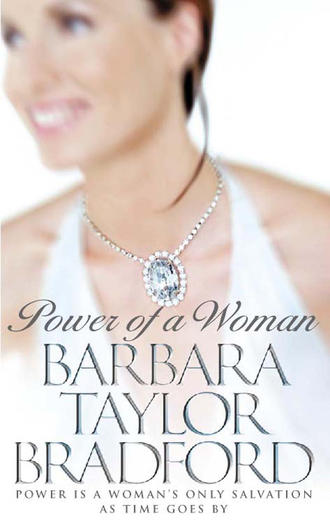
Полная версия
Power of a Woman
“Thank you for letting me know you’re not going to participate. I expect the bidding to go sky high. Don’t you agree?”
“Yes, I do. The stone has not been on the market since the fifties, and so obviously there is a great deal of interest in it. That is the reason I telephoned you, Stephanie, ma petite, to inform you we shall not be bidding against each other, competing. But it will be my great honor to escort you to the auction, if you will permit me to do so.”
“I’d love it, André, thank you.”
“And after the auction we shall dine together, and it will be a grand celebration.”
She laughed a soft, light laugh. “We’ll be celebrating only if I get the White Empress, my dear old friend.”
“There is no doubt in my mind that you will, Stephanie.”
2
ALTHOUGH SHE KNEW EVERYTHING THERE WAS TO know about her favorite diamond, Stevie could not resist taking the Sotheby’s catalogue out of her briefcase after she had said good-bye to André Birron and hung up.
Flipping open the catalogue, she quickly found the page where the White Empress was featured, and gazed for a moment or two at the photograph of the gem. The picture was excellent, but even so it did not do justice to the magnificent stone.
The White Empress. Stevie repeated the name to herself. It certainly deserved to be called that. It was so named because it was graded D-flawless and was therefore perfect. And as such it was colorless—pure white, brilliantly, blindingly white—hence the first portion of its name. Because it was extremely rare and very beautiful, and also categorized as a grand stone, the title of Empress had been chosen to complete its name.
Automatically, Stevie’s eyes shifted to the left-hand page of the catalogue, and she scanned the text. Yet again she was reminded that the White Empress had started out as a 427-carat diamond of exceptionally fine color, and that it had been found in 1954 at the Premier Mines in South Africa.
This piece of rough was subsequently sold in 1956 to Harry Winston, the renowned American jeweler, as part of an eight-million-four-hundred-thousand-dollar parcel.
The largest stone Winston cut from this piece was a 128.25-carat D-flawless pear-shaped diamond, and it was this stone that retained the original name of White Empress. Harry Winston had the stone set as a pendant on an exquisite diamond necklace, designed specially, and then he had sold it that same year to a European industrialist.
Now, after forty years in the hands of one family, it was finally back on the market. Sotheby’s would put it on the auction block at their auction rooms on York Avenue in New York at the beginning of December.
Stevie’s eyes lingered on the photograph for a short while longer before she finally closed the catalogue and returned it to her briefcase. Her thoughts settled on André. Though he was not bidding on the stone, there were many others who would be bidding, and automatically the price would be driven up, as it usually was at these big auctions for important items.
It could skyrocket, she thought, sitting back in the chair, frowning. No, it would skyrocket. There was no doubt in her mind about that; she made the decision to stay in the bidding no matter what, since she was determined to acquire the stone whatever it cost.
Seven-figure numbers jumped around in her head. Six million dollars, seven million dollars…no, too low. Eight million, she speculated, her eyes narrowed in concentration. Still too low, she decided. Suddenly she was convinced the stone would be sold in the eight-figure category. Ten million, she said under her breath. Could it go as high as that?
At this moment Stevie knew that if she had to, she would pay that amount for the stone. She craved it, not for herself, of course, but for Jardine’s in New York, which she had founded.
Once she owned the stone, she would hold on to it for a year or two, displaying it at exhibitions, making it the centerpiece of the store’s permanent collection. She had no intention of cleaving it—cutting it—into several stones, or disposing of it immediately. It was quite obvious to her that the White Empress was a great investment, and in a variety of ways, not the least of which was the publicity the diamond would engender for Jardine’s.
Certainly it would never decrease in value; it could only increase, in fact; and she knew she would have no problem selling it whenever she wished to do so. There were many rich men and women in the world who coveted the grand stones, some of whom were already her clients, and there would always be buyers for this most spectacular of diamonds. After all, in the business it was now considered to be a historic stone.
Owning the White Empress would be the crowning glory of Jardine’s. This thought pleased her. She had started the American company eight years earlier, and although she had done so with Bruce Jardine’s consent, his accord had been grudgingly given. Even today he barely acknowledged its existence.
The store on Fifth Avenue was an enormous success and had been from the very first day it opened. And so Stevie always felt justified in pushing for it, vindicated, in a sense, because the annual earnings were enormous, the profits burgeoning on a yearly basis.
When she had told her father-in-law that she wanted to take Jardine’s, the Crown Jewellers of London, to New York’s Fifth Avenue, he had blanched, gaping at her in astonishment. Naturally, he had balked at the idea. Right from the beginning he had predicted nothing but failure. She had had to use a great deal of charm and persuasiveness to get him finally to agree.
Stevie had realized immediately that he fought the idea of her moving to New York because he wanted to keep her by his side at the London store. Later, he had admitted that this was indeed the case. Put simply, he could no longer do without her. As he grew older, he was becoming more and more dependent on her at work.
When he had stopped ranting at her and calmed down, Stevie had pointed out that he had a grandson who was almost twenty-two, and very capable of taking her place at his side. A young man who couldn’t wait to step into her shoes, in point of fact.
“Under your supervision, Nigel will do a fine job,” she had reassured her father-in-law. Bruce knew as well as she that this was the truth, but he would not admit it, and once more he scotched the idea of opening a store in New York. Stevie had bided her time, worked on him in a gentle but persistent manner, and never lost a chance to point out to him how profitable the American branch could be.
“But I’ll miss you, Stephanie,” Bruce had murmured one afternoon, weeks after she had first presented her plans for Jardine’s of New York. Those few muttered words had told her that however reluctant he was to do it, he was, nonetheless, going to give her his support. This he did, although he never ceased to remind her that it was against his better judgment.
That had happened in 1987; one year later, in 1988, the Fifth Avenue store had opened its doors. And for the first time in more than twenty years she had found herself living in the city where she had been born. She had moved to London at the age of fourteen, after her mother had married Derek Rayner. Even though she had visited New York, it was a foreign city to her. Within the short space of a few weeks, Manhattan was under her skin, and she felt comfortable, at home.
Stevie rose and walked over to the hearth, where she threw another log onto the fire, and then sat in a chair, leaned back, and closed her eyes. It seemed to her that her mind was full of the past today, perhaps because it was November the twenty-seventh. A very special date in her memory. Her wedding day. If Ralph Jardine had lived, this would have been their thirtieth anniversary.
She had never remarried. Some of her friends thought this was odd, but she didn’t, no, not at all. It was really very simple. She had never met anyone she cared about enough to marry. No, that was not strictly true, she corrected herself. After Ralph’s death she had loved another man once, for a brief time, long ago. Marriage had never come into play, at least not from his standpoint, but it had from hers. She knew she would have married him in a flash if he had asked her. He never had. It wasn’t meant to be, she told herself, as she had done over and over again for years. Some things just weren’t meant to happen; and, anyway, you couldn’t have everything in life.
But we believe we can when we’re young, she suddenly thought. When we’re young we’re so certain of our invincibility, our immortality. We’re full of ourselves, blown up with ourselves, our power, our strength. We’re just so sure of it all, so sure we can mold life to our will, make it bend whichever way we want. But we can’t, that’s not the way it is. Life gets at us all in one way or another. It mangles us, brings us down, causes us so much pain. It’s the great leveler, the ultimate equalizer.
Still, my life’s not been so bad, she reminded herself, looking at the positives, as she always did. Her children had turned out relatively well; at least, none of them was drug addicted or soaked in alcohol. And she had built herself a career out of nothing. After all, she had not been gifted with some sort of creative talent to use as a springboard into success. All she had was a practical nature, a steady, levelheaded temperament, and a good head for figures and business, as it had turned out.
She had once said this to André. “But you also know the diamonds, chérie. Ralph taught you almost everything he knew about the stones,” the French jeweler had exclaimed, looking at her in surprise. Vaguely, she heard André’s voice coming to her from a long distance, from the past. “You have a good idea, Stephanie. Go to Bruce. You will see; he will listen to you. The argument you have is a strong one. Valid. Indeed, it is a necessity.”
Her thoughts leapt backward in time, back to the year 1976, and in her mind’s eye she could see Bruce Jardine as he had been then. Tall, dark, good-looking in a saturnine way. But as stubborn and rigid as always. An unbending man.
How well she remembered his scornful expression, his mirthless laugh when she had told him she wanted to work. And at Jardine’s, at that.
Before he could answer her, she added in a quiet voice that she wanted him to train her to run the company.
He had stared at her speechlessly, disbelievingly, all those years ago, and then he had asked her if she had taken leave of her senses.
Twenty years ago. Yet sometimes it seemed like only yesterday. She had been a young widow of twenty-six that summer; it was exactly three years after Ralph’s bungled operation for an appendicitis. Her rage about this shocking tragedy had dissipated with the passing of time, and yet, when she least expected it, she would feel a spurt of anger and dismay about her husband’s unnecessary death.
As it turned out, Ralph had not had appendicitis at all, but a perforated peptic ulcer. The surgeon had not recognized the trouble on the operating table. He had performed the appendectomy, but had not made a second incision to reach and repair the perforation. Peritonitis had advanced to cause the sepsis that had killed Ralph. Everyone knew it was a death that should never have happened.
With his son Ralph gone so unexpectedly, Bruce was now the only Jardine in the family business. His older brother, Malcolm, had retired several years earlier because of ill health, and Bruce was suddenly carrying the burden of Jardine’s entirely alone.
And then, without any warning, he was struck down with a heart attack in February 1976; when he finally recovered, he was debilitated, and panicked.
Stevie had instantly recognized the latter, and had understood the reason for his nervousness. Young though she was at the time, she had a great deal of insight into people, knew what made them tick, what motivated them to do the things they did. In a sudden flash, and with genuine clarity of vision, she realized what she must do, what the solution to Bruce’s problem was.
She was the solution.
And so she had taken André’s advice and gone to see her father-in-law on a warm Thursday afternoon in July, arriving at his office in the Bond Street store unannounced. He had been startled and put out by her unprecedented visit, but being a gentleman of the old school, and courteous, he had invited her into his inner sanctum.
“Teach me the business, train me,” she had said earnestly. “I’m the only Jardine you have right now. Nigel and the twins are still little boys. What will happen to the company if you have another heart attack? Or get sick? Or die?”
Startled by the bluntness of her words, he had looked affronted. And he had stared at her askance, for a moment at a loss for words in the face of her breathtaking directness.
Swiftly she had gone on to explain. “Look, nobody wants to think of his own mortality, or think about dying, I know that. But you have to, you must. Ralph always said you were the most intelligent man he knew. He told me you were extremely clever, a genius really, and clearheaded. So think clearly now. Think unemotionally. You need someone you can trust, a person who could run the company if ever you were incapacitated. And it must be someone who has your grandsons’ interests at heart. Since I’m their mother, that’s me. Obviously. You need me. Anyway, face up to it, I’m the only Jardine available.”
Bruce Jardine had seen the rightness of her words. She was the only adult Jardine he could turn to, and therefore she was the only solution to his very real dilemma. Also, her sincerity, eagerness, and enthusiasm had convinced him that she really did want to work for him and learn the business. And so he had taken her on as his junior assistant, hoping she would not disappoint him.
“You’ve got to love this business if you’re going to be a success at it,” he would tell her repeatedly during the first years she worked at Jardine’s, and Stevie quickly discovered she did love it, every facet of it.
She loved the diamonds particularly, and the other gems and the creative side of the jewelry business. Yet it was the intricacies of the financial and corporate side that fascinated her. Within the first six months of working at Jardine’s, she displayed a talent for figures plus business acumen as well. Bruce had been pleasantly surprised.
It was only natural that she became indispensable to her father-in-law. Bruce Jardine, once her deadly enemy, eventually came around to making his peace with her. He recognized her considerable attributes, her talent, her genuine ability, and her willingness to work hard for long hours. As the months passed, he came to respect her. And he depended on her more and more.
One day, after she had been at Jardine’s for five years, the animosity and contentiousness she had come to expect simply ceased to exist.
Alfreda never became one of her admirers. On the other hand, Bruce’s wife had apparently realized the validity of her husband’s moves; she well understood that Stevie was the one person they could trust as the mother of their grandchildren, their heirs. And so she had kept a civil tongue in her head and stayed out of her daughter-in-law’s way. Alfreda had died in 1982, almost fifteen years ago, but right up to the day of her death she had disliked Stevie, had never shown her any affection or made even the smallest friendly gesture.
Rising, walking back to the desk, Stevie bent forward, picked up her wedding photograph, and peered at it intently for a moment or two. How young she and Ralph had looked. But then, they had been young, she most especially. I was just a little girl, only sixteen, she thought. A child. Why, I was younger than Chloe is now.
Oh, Ralph, who would have believed it? Believed that your father would take me into the business? Or that one day I would be head of Jardine’s on both sides of the Atlantic? She could not help thinking that life, the great leveler, was also so very unpredictable. I couldn’t have accomplished all that I have without friends, good friends, and most especially André Birron. She knew that André had taught her as much as Bruce ever had about the jewelry business. He had been her mentor in certain ways, and a genuine friend, almost like a father.
André had always given her the best advice, the soundest. When she was twenty-seven, she fell in love again, after four years of widowhood. She discovered she was pregnant a year later, and it was to André she had turned. She had flown to Paris to see him, to confide in him, although, being wary by nature, she had done so only to a degree. She had merely alluded to the identity of her lover, the father of her unborn child. Even before she had finished her sentence, André had held up his hand as if in warning.
“Do not tell me who he is. I do not want to know. Remember this, my Stephanie. Confide a secret to one person and it is a secret no longer,” the sage old Frenchman had cautioned.
And so she had kept her own counsel always, for this was her natural inclination. No one had ever known who her lover had been, or even tried to guess the man’s real identity. Not even Chloe knew who her father was.
Chloe. Stevie’s expression changed, became softer as she thought of her eighteen-year-old daughter. Now she was a D-flawless diamond. Quite perfect.
Stevie suddenly broke into a chuckle. Well, not really. Her daughter was only almost perfect, thank goodness. No one wanted a paragon of virtue. They were no fun, and usually too good to be true.
Chloe would be arriving later that afternoon, hopefully in time for dinner, and they would enjoy a cozy evening together. Tomorrow her mother and stepfather would be driving up from Manhattan to spend Thanksgiving Day with them, and the rest of the holiday weekend. She was looking forward to it, just as she knew Chloe was.
Derek Rayner had been knighted by the queen some years before, and he and her mother were now Sir Derek and Lady Rayner. As had been predicted long ago, he was now the greatest classical actor on the English stage, and at sixty-eight a living legend. He had been good to her mother and to her and her children.
Derek and her mother were childless, and so he played the role of father and grandfather to the hilt. But his love for them all was very genuine, and he adored Chloe.
Her son Miles was driving to Connecticut with the Rayners. He was her favorite son, if the truth be known, although she always tried to hide this fact from the others. She loathed playing favorites amongst her children.
Miles was a talented artist and a brilliant set designer. Currently he was living in New York, where he was designing the stage sets for a Broadway play. Unlike his brother Nigel and his twin, Gideon, he had never shown any desire to go into Jardine’s, although with his artist’s eye he had always appreciated the beauty of the jewels and the other objects of art Jardine’s made.
Despite his lack of interest in working in the family business, his grandfather had insisted he become a director since he was a major shareholder in the company. He had done so immediately. Jardine’s was his inheritance, and it had always been an important part of his life; his mother had seen to that.
It was Gideon who was the true jeweler in the family; Stevie had recognized that when he was a child. He was a talented, indeed gifted, lapidary, and he had inherited his father’s love of stones, most especially diamonds. Like Ralph, he was an expert when it came to cutting stones, and as one of the chief lapidaries at Jardine’s, he was involved in the creation of the exquisite jewels that the Crown Jewellers had been renowned for over the centuries.
Nigel, ever the businessman, and the spitting image of Bruce in so many different ways, ran the business end of the company, under her direction.
But Nigel wanted it all for himself.
Stevie was well aware of this these days. There were even moments when she thought her eldest son was plotting her departure from the company, planning her fall from grace.
Now she expelled a long sigh as she strolled back to the fireplace. She stood leaning against the mantelpiece, her thoughts focused on Nigel.
She had no real evidence to go on; it was just plain old gut instinct that told her that her son was against her. For a long time now she had seen Nigel for what he was…very much the way Bruce had been when he was a younger man—cold, calculating, controlling, and very ambitious.
There was nothing wrong with ambition as long as it was focused in the right direction. She was the first to admit this. But it was somewhat ridiculous of her son to be ambitious at her expense. After all, the business would be his one day. He would share it with his brothers equally, of course, but he would be running it as the eldest of the three and the undoubted business brain.
She wished she could shake off the worrying suspicion that Nigel wanted her to trip up in order for him to justify taking over from her in London. And indeed, New York as well.
“Fat chance of that,” she muttered. Bruce would never permit it. Her father-in-law was eighty-two now, and semiretired after some terrible attacks of gout, which had plagued him for years. But he was as alert as ever, not a bit senile, and very spry when he was free of his crippling ailment. She was very well aware that he cared about her, even though he did not show it very often.
Furthermore, and perhaps more to the point, he trusted her implicitly when it came to running the company. She had earned that trust, had proved to him time and again that she not only knew what she was doing but that she was brilliant at it. No, Bruce would not tolerate Nigel’s machinations, what he would term “youthful insubordination.” And he would be on her side.
Rousing herself from her thoughts about her eldest son, Stevie hurried out of the study and headed along the second-floor landing. Of medium height and slim, Stephanie Jardine was an attractive woman, with a head of dark curls, light gray-green eyes, and a well-articulated face. High cheekbones and a slender nose gave her a look of distinction; she was elegant in an understated way, dressed in a loden-green wool pants suit and sweater that brought out the green lights in her eyes.
Stevie took the stairs at a rapid pace, realizing that she had wasted a great deal of time dwelling on the past and Ralph, living through her memories both good and bad. She had guests arriving the next day, and even though they were family, everything had to be well prepared for them nonetheless. Her mother, in particular, had very high standards and was accustomed to a great deal of luxury as the wife of a famous star of stage and screen.
As she reached the great hall, the grandfather clock standing in the corner began to strike. It was exactly six o’clock. Chloe was due to arrive in an hour, and a smile touched Stevie’s eyes at this thought. She could not wait to see her daughter.
Somewhere nearby a door was banging, and she felt a rush of cold air blowing down the great hall. It seemed to be coming from the direction of the sun room, and she went through the archway that led to this area of the house.
The solarium, as it was usually called, was long with many windows; two sets of French doors led out to the covered porch that stretched the length of the back facade of the house. One of the doors had sprung open and it was swinging back and forth on its hinges, banging against a wooden chair.
She went to close it, then paused at the door and peered out. It was a dark night, with a black sky empty of stars. A corridor of bright lamplight streamed out from the solarium, illuminating the porch and its stone balustrade beyond. It diminished the darkness.
Stevie went outside, as she often did at this hour, loving the tranquility, the silence of the countryside. It was so pleasing to her after the din of New York, and especially so at nighttime.







